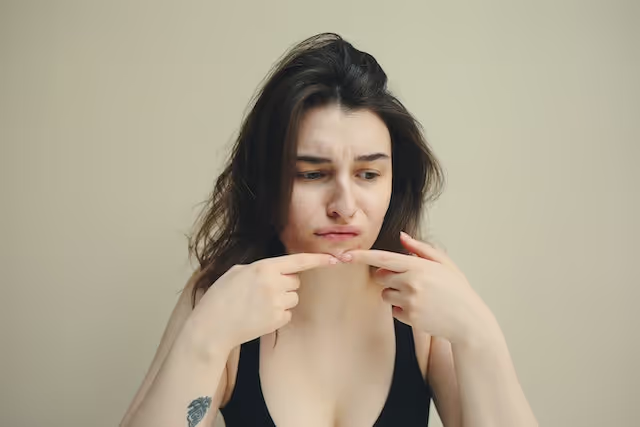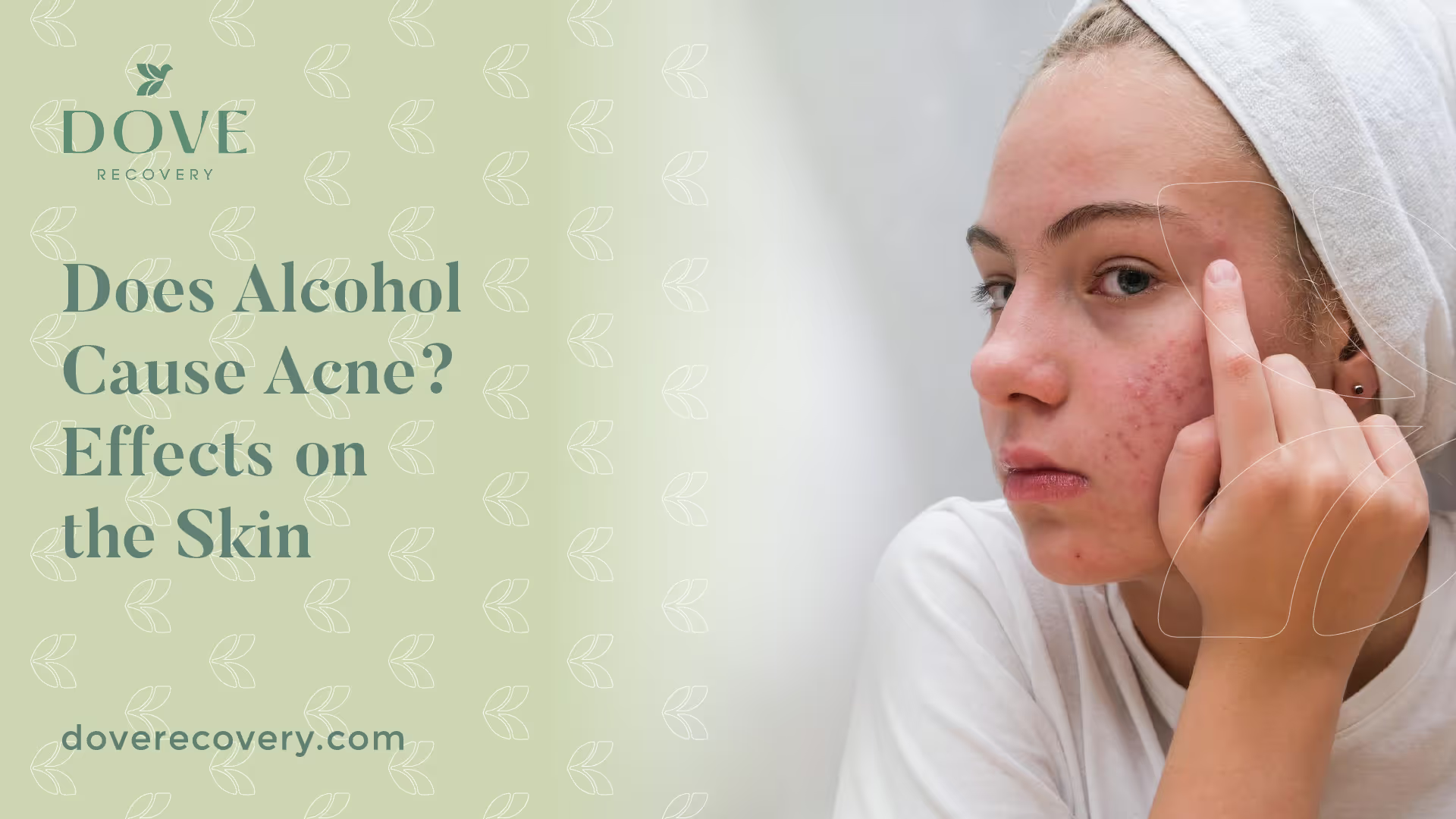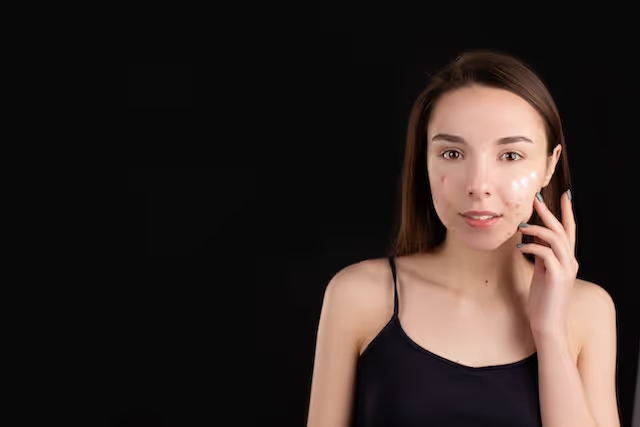Does Alcohol Cause Acne? Effects on the Skin

Does Alcohol Cause Acne?
Acne is a common skin condition that affects millions of people around the world. It can be caused by a variety of factors, including genetics, hormones, and lifestyle choices. One such lifestyle choice that has been linked to acne is alcohol consumption. In this article, we'll take a closer look at whether or not alcohol causes acne and explore the science behind this claim.

What is Acne?
Acne is a skin condition that can be frustrating to deal with. It occurs when hair follicles become clogged with oil and dead skin cells, creating an environment for bacteria to grow. This can lead to the formation of pimples, blackheads, and whiteheads.
Acne can occur anywhere on the body, but it is most commonly found on the face, back, and chest.
Causes of Acne
There are many factors that can contribute to acne, including:
- Genetics
- Hormonal changes
- Stress
- Diet
- Certain medications and skincare products
It's important to understand the root cause of your acne so that you can take steps to manage it effectively.
Thankfully, there are many treatment options available for acne. From over-the-counter topical creams to prescription medications, there is a wide range of products that can help to clear up your skin. Additionally, lifestyle changes such as a healthy diet and regular exercise can also have a positive impact on your skin.
Remember, acne is a common condition that affects people of all ages and backgrounds. Don't be ashamed to seek help if you're struggling with acne. With the right treatment and self-care, you can achieve clear, healthy skin.
The Link Between Alcohol and Acne
There is no denying that alcohol consumption is a significant part of many people's lives. However, what most people don't realize is that alcohol can have a significant impact on their skin health, especially concerning acne.
As per a growing body of research, alcohol consumption can contribute to the development of acne.
One study found that people who drank alcohol regularly were more likely to have acne than those who did not drink. Another study found that alcohol consumption was associated with an increase in sebum production, which can clog pores and lead to acne.
Moreover, alcohol can also disrupt the body's natural hormone balance, leading to an increase in androgen levels, which can contribute to the development of acne.
Additionally, alcohol can cause inflammation in the body, which can make existing acne worse.
It is essential to understand that while alcohol may seem like a harmless indulgence, it can have severe repercussions on our skin's health. Therefore, it is advisable to limit alcohol consumption or avoid it altogether if you are prone to acne or other skin issues.
Instead, opt for healthier alternatives like water, fresh juices, or herbal teas, which will not only keep you hydrated but also help maintain healthy and clear skin.
How Alcohol Can Affect the Skin's Natural Moisture Balance

Alcohol consumption can also affect the skin's natural moisture balance. Alcohol is a diuretic, which means that it can cause dehydration by increasing urine production and reducing the body's ability to retain water. When our skin becomes dehydrated, it can lead to dryness, flakiness, and even premature aging.
Moreover, alcohol can also strip the skin of its natural oils, which act as a barrier against harmful environmental factors such as pollution and UV rays. This loss of natural oils can further exacerbate dryness and make the skin more susceptible to damage.
Therefore, it is essential to maintain adequate hydration levels by drinking plenty of water throughout the day. Additionally, using a moisturizer that suits your skin type can help replenish lost moisture and restore your skin's natural barrier function.
Remember that healthy skin requires an inside-out approach. By limiting or avoiding alcohol consumption altogether and adopting healthy habits like drinking enough water, eating a balanced diet, and getting enough sleep, you can achieve healthy and radiant-looking skin.
The Effects of Alcohol on the Skin's Aging Process
Alcohol consumption can have a range of negative effects on the skin, including:
- Acne: Alcohol dehydrates the skin and can cause inflammation, leading to acne breakouts.
- Premature aging: Alcohol is a known pro-inflammatory agent that causes oxidative stress, which can damage healthy cells and lead to premature aging. This can manifest as wrinkles, fine lines, and sagging skin.
- Redness: Alcohol consumption can cause blood vessels to dilate, leading to redness in the face and other areas of the body. This increased blood flow can further exacerbate inflammation and increase the risk of developing wrinkles and fine lines.
- Loss of elasticity and firmness: Alcohol can weaken collagen fibers in the skin, leading to a loss of elasticity and firmness. Over time, this can result in sagging skin, wrinkles around the eyes and mouth, and other signs of premature aging.
To maintain youthful-looking skin, it is essential to limit or avoid alcohol consumption altogether. Instead, opt for healthier alternatives like antioxidant-rich foods such as berries and leafy greens that can help protect against oxidative stress and maintain healthy cells.
Remember that prevention is always better than cure when it comes to skincare. By adopting healthy habits like limiting alcohol intake and nourishing your body with nutrient-rich foods, you can keep your skin looking youthful and radiant for years to come.
The Relationship Between Stress and Acne
Stress is a common trigger for acne breakouts. When we are stressed, our bodies produce more cortisol, a hormone that can increase sebum production in the skin. This excess sebum can then clog pores and lead to the development of acne.
Moreover, stress can also weaken our immune system, making us more susceptible to skin infections and inflammation.
Alcohol consumption can exacerbate stress levels, leading to an increase in cortisol production and worsening of acne symptoms. While it may seem like alcohol helps to relieve stress initially, it is only a temporary solution.
In reality, alcohol can disrupt our sleep patterns and cause dehydration, which can further worsen stress levels and make acne worse.
Therefore, limiting or avoiding alcohol consumption altogether and adopting healthy stress-relieving habits such as exercise, meditation, or yoga can have a positive impact on your skin's health.
By managing your stress levels effectively, you can reduce the likelihood of developing acne breakouts and achieve clear, healthy-looking skin.
The Different Types of Alcoholic Beverages and Their Potential Effects on the Skin
Not all alcoholic beverages are created equal when it comes to their effects on the skin. Some types of alcohol contain higher levels of sugar, which can lead to inflammation and breakouts. Other types of alcohol, such as red wine, contain antioxidants that can have a positive impact on the skin.
Let's take a closer look at some of the most popular types of alcoholic beverages and their potential effects on the skin:
Beer
Beer is a popular alcoholic beverage that many people enjoy. However, it's important to note that beer contains high levels of yeast and carbohydrates, which can contribute to inflammation in the body. This inflammation can then lead to acne breakouts or exacerbate existing acne symptoms.
Furthermore, beer is often served in large quantities, leading to dehydration, which can cause dryness and premature aging of the skin.
Wine
Wine is another popular alcoholic beverage that has both positive and negative effects on the skin. Red wine contains antioxidants called polyphenols that have been shown to reduce inflammation in the body and protect against damage from harmful UV rays.
However, drinking too much red wine can lead to dehydration, which can cause dryness and flakiness of the skin.
White wine, on the other hand, contains high levels of sugar and sulfites that can contribute to inflammation in the body. This inflammation can then lead to acne breakouts or exacerbate existing acne symptoms.
Spirits
Spirits such as vodka, gin, whiskey, or tequila are often mixed with sugary drinks like soda or juice. These mixers contain high levels of sugar that can contribute to inflammation in the body and lead to acne breakouts or exacerbate existing acne symptoms.
Moreover, spirits are often consumed in large quantities leading to dehydration which can cause dryness and premature aging of the skin.
In conclusion, while alcohol consumption may be enjoyable, it's important to understand that different types of alcoholic beverages can have varying impacts on the skin. Limiting or avoiding alcohol consumption altogether and opting for healthier alternatives like water or fresh juices can help maintain healthy and clear skin.
The Role of Diet
While alcohol consumption has been linked to acne, it is important to note that diet also plays a significant role in the development of this skin condition. Eating a healthy, balanced diet with plenty of fruits and vegetables can help keep your skin clear and healthy. Foods high in antioxidants, like berries and leafy greens, can help fight inflammation and keep your skin looking its best.
On the other hand, a diet high in sugar and processed foods can cause inflammation in the body, which can contribute to the development of acne. It's important to limit your intake of these types of foods and opt for whole, nutrient-dense foods instead. Additionally, dairy products have also been linked to acne in some studies. If you're struggling with acne, it may be worth experimenting with cutting back on dairy to see if it makes a difference.
In addition to making dietary changes, it's also important to take good care of your skin. This means washing your face twice a day, using gentle products that won't irritate your skin, and avoiding picking or squeezing pimples. With the right diet and skincare routine, you can keep your skin clear and healthy for years to come.
The Role of Exercise in Maintaining Healthy Skin
While diet and skincare routines are important factors in maintaining healthy skin, exercise also plays a significant role. Exercise helps to improve blood flow and circulation throughout the body, which can promote healthy skin cell turnover and regeneration.
Moreover, regular exercise can help to reduce stress levels, which as we mentioned earlier, is a common trigger for acne breakouts. Stress reduction through exercise can lead to clearer skin and fewer breakouts.
Additionally, exercise can help to regulate hormone levels in the body, which can contribute to the development of acne. By keeping hormone levels in check, you may be able to reduce your risk of developing acne or other skin issues.
When it comes to exercise and skin health, it's important to find activities that work for you. Whether it's running, yoga, weightlifting, or dancing, any form of physical activity that gets your heart rate up and makes you sweat can have a positive impact on your skin's health.
Remember that consistency is key when it comes to exercise. Aim for at least 30 minutes of moderate-intensity exercise per day or 150 minutes per week. With regular exercise and good skincare habits like washing your face after working out and staying hydrated throughout the day, you can achieve healthy and radiant-looking skin.
Conclusion
While the link between alcohol and acne is still being studied, there is evidence to suggest that alcohol consumption can contribute to the development of this skin condition. It is important to remember that acne is a complex condition that can be caused by a variety of factors, including genetics, hormones, and lifestyle choices. If you are concerned about your acne, it is always best to consult with a dermatologist who can help you develop a personalized treatment plan.
Sources:
- https://gutpathogens.biomedcentral.com/articles/10.1186/1757-4749-3-1
- https://www.sciencedirect.com/science/article/pii/S0738081X10000783
- https://www.ncbi.nlm.nih.gov/pmc/articles/PMC4106357/
